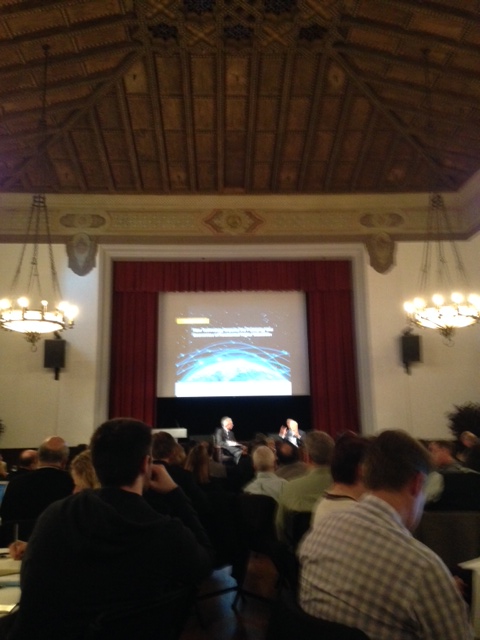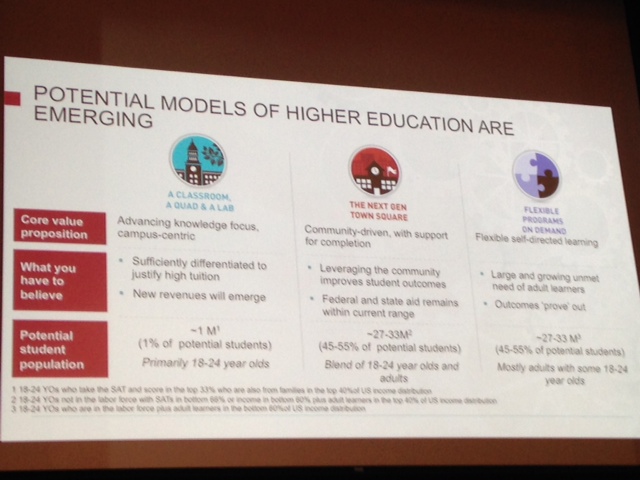Online Learning Summit
By Alexandra Juhasz, Pitzer College
FemTechNet, collaborative makers of “the anti-MOOC,” were graciously, no I’d even say studiously received by leaders of the bellies-of-the-beast at last weekend’s Online Learning Summit, hosted by Berkeley, Harvard, MIT, and Stanford (the great research institutions who put money and a spotlight on what would first be the year, but quickly the boondoggle of, the MOOC.). President Hennessy of Stanford started us off by indicating that the Massive of MOOCs should really be rethought as the moderate; and Open ended up generating a host of problems people hadn’t quite predicted (particularly the great differences of skills, knowledge, and attention of the masses who came; demonstrating “a dynamic range of ability.”)

Opening Remarks and Q&A with Nicholas B. Dirks, Chancellor, U.C. Berkeley
and John Hennessy, President, Stanford University
The speakers at the Summit were interested to name both what MOOCs have proven to be good and not so capable at:
- not good at generating revenue
- not good at “human content-enhanced learning” (Ellen Junn, Provost, CSU, Dominguez Hills) or feeling connected to what one learns or the “human touch”
- not good at much besides content-provision, and isn’t learning more than this?
- great for book-clubs for life-learners (alumni, people with little access to quality education)
- great as text-books to be used by working professors in their own classes; in a new world of “more content” teachers will be able to use MOOCs and other open content to choose between and enhance their own teaching
- great opportunities to learn about learning; educate the educator
- great at further stratifying an already-stratified higher education system whereby elite institutions (like the ones hosting the event and the one at which I teach) can continue to provide and even improve face-to-face and residential education with the selective, thoughtful use of technology while less-privileged institutions will use technology to try to save costs, educate more “efficiently,” and/or through the noblese oblige of elite institutions who will share their highly produced and exceedingly expensive content for free or at lost cost with the lesser-thans. It appears only 1 million Americans within higher education (1%) currently receive the “Classroom, Quad and Lab” that were once the gold-standard of our liberal education; this 1% will greatly improve through smart uses of digital learning! (Patrick Methvin, Deputy Director of Postsecondary Success, U.S. Program, Bill and Melinda Gates Foundation)
slide by Patrick Methvin
We went on to hear from administrators, professors and technology professionals about better models—and some wacky experiments, too; all agreed that this was the time for innovation, experimentation and even play (for those with the support to do so)—for digitally enhanced learning (including our own DOCC). Such experiments would use technology to help professors be more than content experts, but also expert pedagogues; thereby “amplifying the effectiveness of professors and students”:
- Learning Management Systems that allowed for live, synchronous classes that are socially networked
- the building of flexible curricula and pedagogy from “units of learning” or self-contained modules (Eric L. Grimson, Chancellor for Academic Advancement, Massachusetts Institute of Technology)
- tools to provide more individual and individuated attention
Of course, feminist pedagogy has been making just such claims, and theorizing and practicing from them, for generations (see our white paper), and it’s a thrill, really, to see leaders from across academia listening to our old, successful, and next-gen models!
FemTechNetters, Anne Balsamo and Radhika Gajjala will tell it all to you!


On MOOCs – Final Class Stanford Educ217x/CompLit | Gabriele Dillmann
March 18, 2014 @ 1:41 pm
[…] https://www.femtechnet.org/2014/03/online-learning-summit/ […]